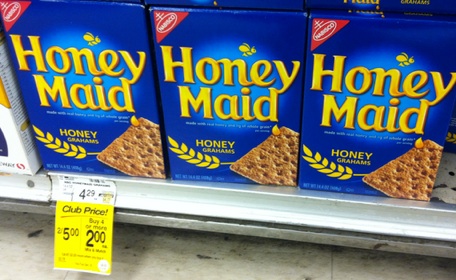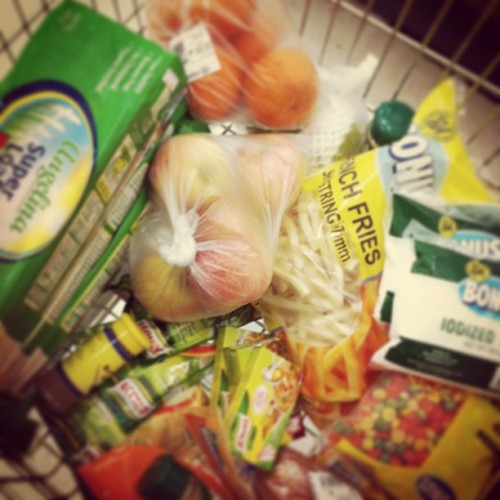I am pushing her in a wheelchair with a small basket for groceries attached. Walmart is too big for Betty to take with her orthopedic shoes and walker. Her bones ache too persistently. I lean down every once in a while, speaking into her ear in a loud whisper. Her hearing aids pick this up.
Two other people rode the grocery van with us this week: Art and Myrtle. They are walking around Walmart on their own.
Art is eighty-something and legally blind. Gray film glazes his pale blue eyes. His voice and his body shiver constantly, as if constantly chilled to the bone. As he walks, he holds out his white and red segmented cane, feeling out the space between the blurs.
Art always insists we students do not take him around the store. He makes his way to the Customer Service Desk, where they reserve a Walmart employee to walk with him.
I've tried to tell him that I don't mind going with him. "They know where the stuff is anyway, and you don't," he told me once, voice shaking.
All Art buys is tupperware, soil, and plant food. I'd discovered why a year ago as I stepped into his living room with full plastic bags. Not a piece of furniture was in sight. Tall aluminum shelves neatly lined his living room, rows curling with the crisp, young vines of hundreds of tropical plants. Even though the room temperature spiked at 80 degrees, he never stopped shivering. He grooms these plants as if they are part of his large family, all basking in this hothouse together.
Betty can't stand Art. She rolls her eyes at me when he talks about the new African violet he's aquired or how to properly feed a plant.
Betty doesn't seem to like Myrtle very much either, even though this is only the second time she's gone to the grocery store with us. Myrtle is a sweet, wrinkle-faced woman with thin brown hair. Her knees act up in the winter, so she totes a small cane, favoring her right leg.
"I can walk the store myself," Myrtle tells us. "It's just these roads I'm afraid of. After I rolled my car three times, you know, I won't drive in bad weather."
"Did you hear her?" Betty hissed to me later. "She doesn't need help." She shakes her head, sadness flickering through the disdain in her eyes.
Later, I am putting away Betty's groceries. "Where does the bread go, Betty?" I hold up the wheat loaf, showing it to her. Sometimes I don't know if she hears me. Often I see her reading my lips, moving her own after mine, chasing the remnants of my sentences.
"Oh, in the freezer. I have to finish the white bread first." She wrinkles her nose as she says this. "You don't have to put my groceries away," she tells me. I look at her, but she is avoiding my eyes.
"It's okay Betty. That's what friends do for each other. You know?" I smile at her as I line cups of diced peaches next to the applesauce. The fruit juice swishes to the bottoms of the containers as I set them on top of one another, aluminum coverings kissing. I don't know if Betty's body would let her put the groceries away.
She smiles back at me, and then half apologizes. "I'm not very pleasant today," she admits.
"That's okay, Betty," I say. "The good thing about being friends is you can be grumpy sometimes and it's alright." I wink at her and stand, stuffing the plastic bags into their sunflower holder.
She smiles, and a little light sparks in her eyes. I tell her it's time for me to go.
"Okay hon," she responds,"you have a good day." She shuffles her walker to the door, her shoulders hunching. I follow her.
"Goodbye, Betty." I kiss her on the cheek, and her smile widens. I do this every time I say goodbye. "I'll see you next week. You take care, okay?"
She giggles in her way. "Okay. Goodbye." She smiles and waves as I step out into the hallway. I close the door, and she deadbolts it behind me. I sweep my hair behind my ear with one hand and button my camel pea coat, stepping into the elevator.


